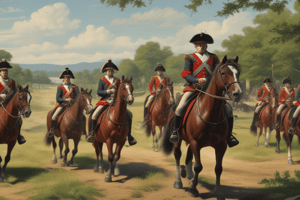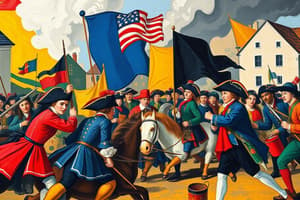Podcast
Questions and Answers
What were the first major events that sparked colonial discontent?
What were the first major events that sparked colonial discontent?
- The Townshend Acts and Tea Act
- The Intolerable Acts and Proclamation of 1763
- The Coercive Acts and Boston Tea Party
- The Sugar Act and Stamp Act (correct)
Why did the colonists object to the taxes imposed by the British Parliament?
Why did the colonists object to the taxes imposed by the British Parliament?
- They wanted more taxes to be imposed
- They wanted representation in the decision-making process (correct)
- They wanted to pay higher taxes
- They were not affected by the taxes
Which act aimed to prevent colonists from settling west of the Appalachian Mountains?
Which act aimed to prevent colonists from settling west of the Appalachian Mountains?
- Coercive Acts
- Proclamation of 1763 (correct)
- Intolerable Acts
- Sugar Act
What was the response of British authorities to the Boston Tea Party?
What was the response of British authorities to the Boston Tea Party?
Which event led to the enactment of the Intolerable Acts by British authorities?
Which event led to the enactment of the Intolerable Acts by British authorities?
What was the primary reason for the conflict between the colonists and Great Britain?
What was the primary reason for the conflict between the colonists and Great Britain?
What was the impact of the Quartering Act of 1765 on colonial-British relations?
What was the impact of the Quartering Act of 1765 on colonial-British relations?
Which philosophical movement had a significant impact on the American Revolution?
Which philosophical movement had a significant impact on the American Revolution?
Who were some of the key colonial leaders that played crucial roles in resisting British rule?
Who were some of the key colonial leaders that played crucial roles in resisting British rule?
Which of the following ideas provided the intellectual foundation for the American Revolution?
Which of the following ideas provided the intellectual foundation for the American Revolution?
What were some of the factors that led the colonists to take up arms against their mother country?
What were some of the factors that led the colonists to take up arms against their mother country?
What was the outcome of the conflict discussed in the passage?
What was the outcome of the conflict discussed in the passage?
Flashcards are hidden until you start studying
Study Notes
The First War of Independence: Understanding its Origins
The First War of Independence, also known as the American Revolution, was a pivotal event in world history that began in 1765 and ended with the signing of the Treaty of Paris in 1783. This conflict arose from a series of political, economic, and social tensions that stretched over several decades. To fully grasp the causes of this historic struggle, let's delve into the key factors that led the colonists to take up arms against their mother country, Great Britain.
Taxation without Representation
The imposition of the Sugar Act and Stamp Act in the 1760s were the first major events that sparked colonial discontent. These acts, along with others such as the Townshend Acts and the Tea Act, aimed to raise revenue from the colonies. However, the colonists objected to being taxed by a British Parliament in which they had no representation. They argued that since they were not directly involved in the decision-making process, they should not be subjected to taxes.
Regulatory Acts
As the conflict escalated, British authorities enacted several measures to assert control over the colonies. The most notable of these were the Intolerable Acts and the Proclamation of 1763. The Intolerable Acts, also known as the Coercive Acts, were a series of punitive measures enacted in response to the Boston Tea Party. The Proclamation of 1763, on the other hand, aimed to prevent colonists from settling west of the Appalachian Mountains. These regulatory acts further heightened tensions between the colonists and the British government.
Military Presence
The presence of British troops in the colonies during the 1760s and 1770s contributed to the escalation of conflict. For instance, the Quartering Act of 1765 required colonies to provide accommodation and supplies for British troops. This led to increased tensions between British soldiers and the colonial population, with incidents such as the Boston Massacre occurring as a result.
Ideological Influences
The Enlightenment, a philosophical movement that emphasized the natural rights of individuals, had a significant impact on the American Revolution. Ideas such as the social contract, the right to self-government, and the rule of law were popularized by philosophers like John Locke, Jean-Jacques Rousseau, and Montesquieu. These ideas provided the intellectual foundation for the American Revolution, with many colonists coming to believe that they had a right to govern themselves and that their British rulers were violating these rights.
Colonial Leadership
Colonial leaders such as Samuel Adams, Thomas Jefferson, and George Washington played a crucial role in orchestrating the resistance against British rule. Their vision for an independent United States and their ability to mobilize support from the populace were key factors in the success of the American Revolution.
In conclusion, the First War of Independence arose from a complex interplay of political, economic, and ideological factors. The colonists' belief in the right to self-government, combined with their opposition to British rule, led them to take up arms against their mother country. The conflict ultimately resulted in the creation of a new nation and a redefinition of the relationship between citizens and their government.
Studying That Suits You
Use AI to generate personalized quizzes and flashcards to suit your learning preferences.




